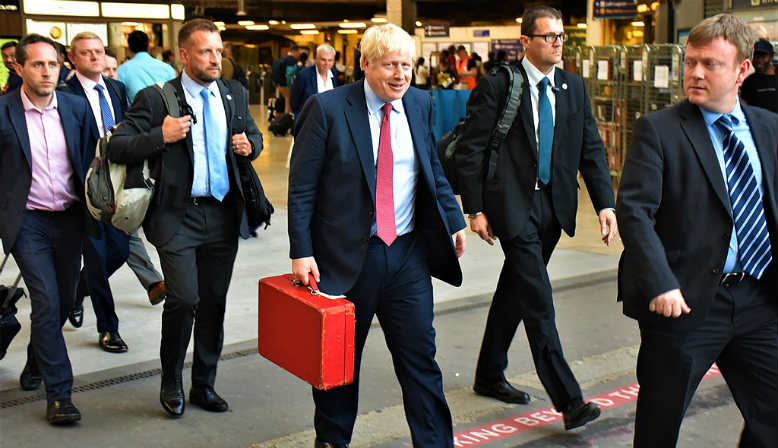 Boris Johnson. Source: Wikipedia
Boris Johnson. Source: Wikipedia
We have to challenge the government’s response to Coronavirus which threatens to hit the poorest hardest and fails to address the structural problems around public health, argues Katherine Connelly
The Coronavirus has revealed the state of British society after decades of neoliberalism and ten years of austerity. It has shown that the race to the bottom over workers’ rights, pay and conditions has left us more vulnerable to threats to public health.
A victory was achieved on 4 March when Boris Johnson was forced to concede that workers who take sick leave because of infection with the Coronavirus would be paid statutory sick pay from the first day of that leave, rather than from the fourth as originally planned.
However, this does not go nearly far enough because nearly 2 million people do not earn enough to receive statutory sick pay.
In the event of a large-scale outbreak, which seems ever more likely and for which the government is planning, it is the poorest paid workers who will face the cruelest decision: whether to sacrifice their own and others’ health or their income. Boris Johnson’s response, when questioned on this, was to advise workers who don’t qualify to get “help through existing systems such as universal credit”. A typically callous response, since universal credit is widely linked with plunging people into poverty.
The problems with access to statutory sick pay have been exacerbated by the huge rise in insecure work over the past decade: nearly a million people are on zero-hours contracts with no guaranteed work. This is over five times the number of workers who were on zero-hours contracts in 2010 – the year the Conservatives got into government. The TUC’s figures show that 34% of those on zero-hours contracts are not eligible for statutory sick pay.
Others trapped in low pay include many young workers – 22% of workers aged 16 to 24 are not eligible for statutory sick pay, nor are 26% of older workers aged 65 and over who have been judged among the most vulnerable to the virus.
Low pay mirrors and exacerbates the inequalities inside society which is why women are disproportionately hit by this. 10% of women workers are not eligible for statutory sick pay.
The lowest-paid jobs include work in health, social care, and cleaning and are the sectors in which women workers are heavily represented. In the fight against the Coronavirus, these sectors are going to be vitally important. There have been a number of high profile strikes by cleaners for a living wage, often in difficult circumstances against vindictive employers. The justice of their cause, and the importance of their work and that of other low paid workers, should be recognised at once.
Precarious work has now been proved a health risk. The damage done by decades of neoliberalism, which shifted more power to employers and tore up rights for workers, must be undone if we want to have a society that can effectively combat new threats to public health.
Government response
The government’s response so far shows no such appetite to address the structural problems in British society. Quite the opposite.
It has been suggested that emergency powers will allow for class sizes to expand beyond currently imposed limits. In other words, one response to a public health crisis might be to weaken health and safety legislation!
The impact of such a decision would be felt disproportionately in state schools where class sizes tend to be far bigger than in private schools. But, typically, there has not been any suggestion that the resources of private schools might be redistributed to help pupils elsewhere.
The government’s approach to the NHS – on the front-line of tackling the virus – is similarly short-term and short-sighted. The plan to delay the virus outbreak until the summer speaks volumes about the huge pressure that is always placed on the NHS in the winter months – a problem exacerbated by austerity, particularly the cuts to social care which have seen people kept in hospital without the support they need to leave the hospital.
Another plan is to draw upon retired doctors and nurses to fill the staffing gap. The BMA have questioned the wisdom of drafting in older people to tackle a virus to which older people are more vulnerable. Moreover, it’s hardly a long-term solution for a service that is suffering a recruitment crisis.
Alongside short-term, emergency measures, the government should be committing to solving the staffing shortages in the NHS. One crucial factor in the shortage of nurses was the government’s decision in 2017 to cancel the bursaries and reimbursement of tuition fees for student nurses. After nurses’ campaigns, and a public outcry, the bursaries have been reintroduced – the reimbursement of fees should also be restored. Increasing pay is also an important factor – as it’s been widely reported that nurses have been among those turning to food banks to make ends meet.
Saving our health
The concession the government were forced into over sick pay from day one shows that gains can be made. This should give us confidence to fight for sick pay for all and then go on to challenge the wreckage of austerity. Saving our health means a fight to save our NHS, for decent pay and secure contracts and an end to inequality.

